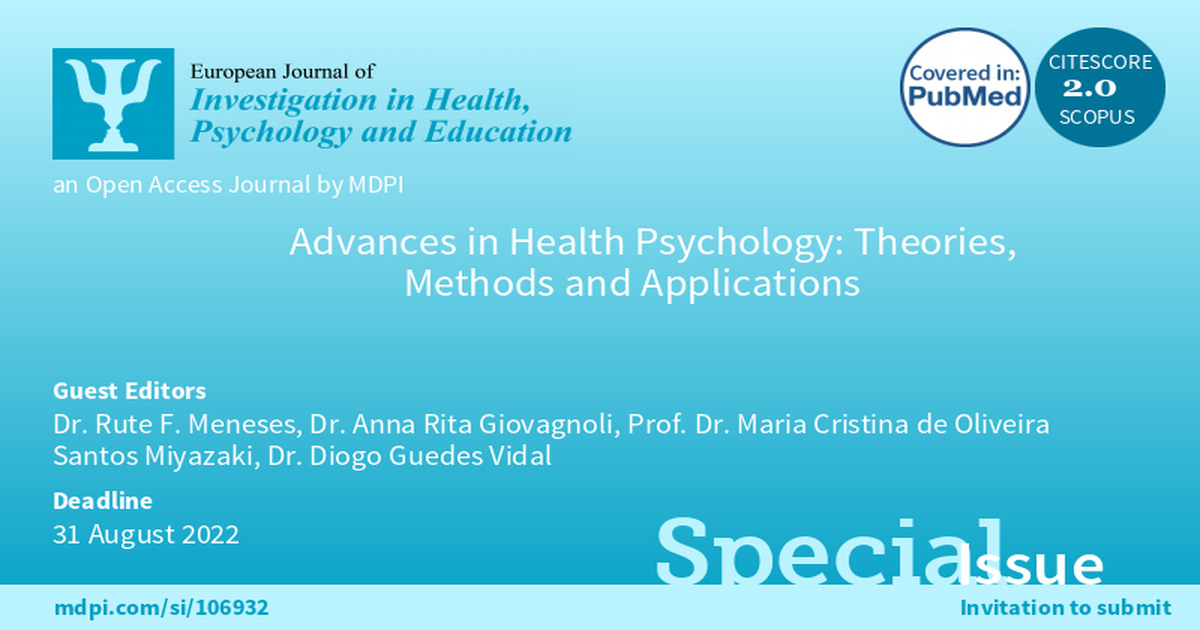Advances in Health Psychology: Theories, Methods and Applications
A special issue of European Journal of Investigation in Health, Psychology and Education (ISSN 2254-9625).
Deadline for manuscript submissions: closed (31 August 2022) | Viewed by 26630

Special Issue Editors
2. FP -I3ID, CTEC, Universidade Fernando Pessoa, 4249-004 Porto, Portugal
Interests: health practices; quality of life; spirituality; social skills; positive psychology; health and well-being promotion; leisure psychology; group interventions
Interests: cognitive-behavioral neurology; neuropsychology; quality of life; cognitive rehabilitation; psychotherapy; brain basis of behavior
Interests: health psychology; cognitive-behavior therapy
Interests: sociology; research methodology; data analysis; sustainable development; statistical analysis; data collection; quantitative analysis; survey analysis; urban sustainability
Special Issues, Collections and Topics in MDPI journals
Special Issue Information
Dear Colleagues,
Even before Matarazzo coined the term Health Psychology and Martin Seligman popularized the expression Positive Psychology, hundreds of studies conducted all over the world were undoubtedly related to these two broad topics. An enormous number of assessment and intervention instruments have been developed, adapted and tested in these fields. Individual and group behaviours in “normal” and challenging periods have been analysed, modified and predicted. Consequently, a considerable number of systematic literature reviews central to the work of health psychologists have been published. In this context, this Special Issue of EJIHPE aims to synthesise some of the remarkable advances in Health Psychology, from theoretical to applied aspects.
Considering the individual and social impacts of this research, we are honoured to invite you to submit papers to be presented in this Special Issue of EJIHPE. This Special Issue is guest-edited by Prof. Rute F. Meneses. Manuscripts should be submitted by 31 May 2022. See the Special Issue website for further details and submission instructions.
Submissions of complete manuscripts of original research on any of the topics of interest is strongly recommended. Papers submitted to this Special Issue of EJIHPE will undergo the standard peer-review procedure, and published papers will be indexed by the ESCI (Web of Science).
Dr. Rute F. Meneses
Prof. Dr. Anna Rita Giovagnoli
Prof. Dr. Maria Cristina de Oliveira Santos Miyazaki
Dr. Diogo Guedes Vidal
Guest Editors
Manuscript Submission Information
Manuscripts should be submitted online at www.mdpi.com by registering and logging in to this website. Once you are registered, click here to go to the submission form. Manuscripts can be submitted until the deadline. All submissions that pass pre-check are peer-reviewed. Accepted papers will be published continuously in the journal (as soon as accepted) and will be listed together on the special issue website. Research articles, review articles as well as short communications are invited. For planned papers, a title and short abstract (about 250 words) can be sent to the Editorial Office for assessment.
Submitted manuscripts should not have been published previously, nor be under consideration for publication elsewhere (except conference proceedings papers). All manuscripts are thoroughly refereed through a single-blind peer-review process. A guide for authors and other relevant information for submission of manuscripts is available on the Instructions for Authors page. European Journal of Investigation in Health, Psychology and Education is an international peer-reviewed open access monthly journal published by MDPI.
Please visit the Instructions for Authors page before submitting a manuscript. The Article Processing Charge (APC) for publication in this open access journal is 1600 CHF (Swiss Francs). Submitted papers should be well formatted and use good English. Authors may use MDPI's English editing service prior to publication or during author revisions.
Keywords
- positive psychology
- community psychology
- health promotion
- disease prevention
- behavior, lifestyle and health
- technology and health
- psychopathology
- leisure and health
- health and disease throughout a lifespan
- complementary and alternative medicine
- health communication
- healthcare teams
- health and the environment
- sustainable development goals
- sexual health
- spiritual health and well-being
- psychological assessment in health settings
Benefits of Publishing in a Special Issue
- Ease of navigation: Grouping papers by topic helps scholars navigate broad scope journals more efficiently.
- Greater discoverability: Special Issues support the reach and impact of scientific research. Articles in Special Issues are more discoverable and cited more frequently.
- Expansion of research network: Special Issues facilitate connections among authors, fostering scientific collaborations.
- External promotion: Articles in Special Issues are often promoted through the journal's social media, increasing their visibility.
- Reprint: MDPI Books provides the opportunity to republish successful Special Issues in book format, both online and in print.
Further information on MDPI's Special Issue policies can be found here.









